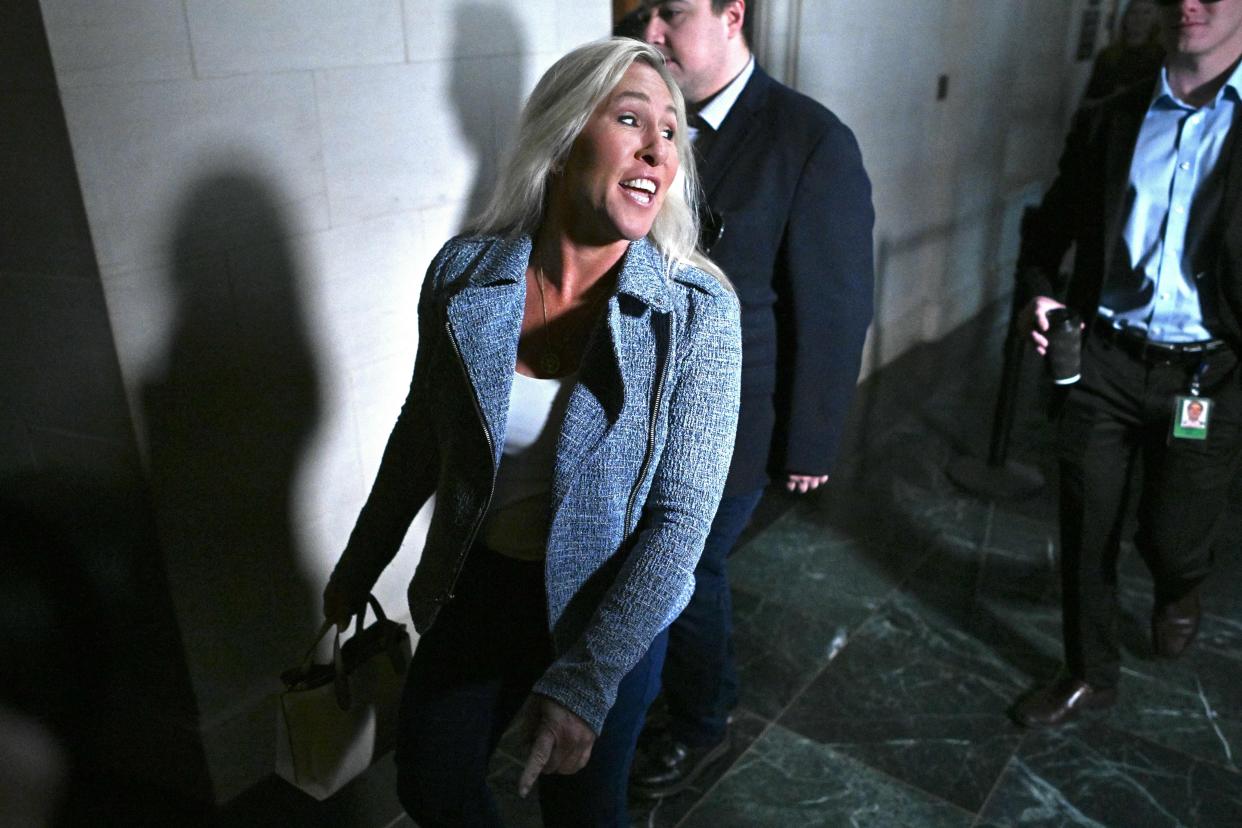House Republicans Won’t Be Able to Keep Their Speaker Mess Behind Closed Doors

- Oops!Something went wrong.Please try again later.
- Oops!Something went wrong.Please try again later.
In January, the process of electing Kevin McCarthy to be speaker of the House was a circus. It lasted 15 ballots over three days and was a chaotic tire fire. There were fisticuffs live on C-SPAN, and members eventually cast their ballots for the third person in the line of presidential succession by mimicking internet memes.
The race to succeed McCarthy after he was ousted last week is likely to be just anarchic, only slightly less of a scene. As Republicans prepare to select their choice to be speaker designate, the rules may more closely resemble a papal conclave than anything we’re used to on Capitol Hill.
But the votes won’t be taken in any place resembling the Sistine Chapel, and no one can accuse an electorate that includes George Santos and Lauren Boebert of being particularly holy. Instead, House Republicans will gather in a large committee room in one of the office buildings on Capitol Hill and hope that they can somehow emerge with a consensus over who the next speaker will be. It will most likely come down to one of two candidates: Steve Scalise of Louisiana and Jim Jordan of Ohio. [Update, Oct. 11, 2023, at 2:15 p.m.: Republicans narrowly nominated Louisiana Rep. Steve Scalise as their choice to lead the House, but Scalise still needs to get 217 votes on the House floor before he has the position.]
Before the vote, on Tuesday, members listened to both candidates answer roughly three dozen questions from fellow congressional Republicans and try to make their case. It was a diverse audience that left many members skeptical for very different reasons.
Mike Garcia of California, who represents a swing district in suburban Los Angeles, tried to ask both candidates what they would do to appeal to the “middle third” of the country. He thought that the answers were less than satisfying. “I think they’re both going back to their happy places, which is a ‘rah-rah Republican Party’ kind of mindset. You know, I don’t think that that’s the right solution,” he told reporters afterward.
Ken Buck of Colorado, an idiosyncratic conservative who was one of the eight to vote to oust McCarthy, was disappointed with the lack of specificity he got on the federal budget from either of the two candidates in the forum. “I am not thrilled with either one of them in terms of giving us a number that we’re going to spend towards.”
The Colorado Republican went so far as to say that he was planning on voting for neither of the two candidates on the first ballot and that he thought that as many as 30 or 40 of his colleagues would do the same.
In a normal world, even dealing with these issues wouldn’t be terribly complicated. There are 221 House Republicans and two candidates for speaker. Scalise is an established member of House leadership who was second in line under McCarthy, while Jordan is a longtime right-wing firebrand turned McCarthy ally who currently serves as chair of the House Judiciary Committee. Republicans would gather in a room and hold a secret ballot vote. One of the two men would eventually get a majority, and all 221 House Republicans would abide by that result and vote in unison for the winning candidate on the floor of the House. But in case you haven’t been paying attention, things aren’t normal. Getting to a consensus is going to be messy.
Now the goal is simply to air as little of it on C-SPAN as possible. As Thomas Massie of Kentucky told reporters on Tuesday, “January was a coronation that was really hard to pull off, and this is a legitimate speaker race.”
The result is that even before Republicans vote on who they will nominate to be speaker, they will first vote on a complicated rules proposal offered by Chip Roy of Texas to create a multistep process for the closed-door election. First, a candidate has to get a majority of the conference via secret ballot. Then, after a question-and-answer period, there will be a second vote via secret ballot, during which members are asked if they would support that candidate on the floor of the House. If there are less than 217 votes on that second ballot— 217 is the number required for a majority on the House floor to do so—the process continues. Eventually, the ballot shifts to a roll-call vote, and if the candidate doesn’t receive the support of 217 Republicans, the process starts over.
If the closed-door election rule passes, House Republicans could be in for a long week trapped together in their committee room until a consensus is finally reached. If it doesn’t, we’re simply back to where things were in January, when Republicans duked it out, sometimes literally, on the floor of the House.
Regardless, it will be a long week. Republicans were less than confident when asked if anyone—or anything—could get the support of 217 members of their conference Tuesday night. Juan Ciscomani of Arizona simply repeated the phrase “That’s to be seen tomorrow.” He added, “Hopefully members can go home or go to their beds tonight, reflect on what’s at stake, and then we can just move on.”

